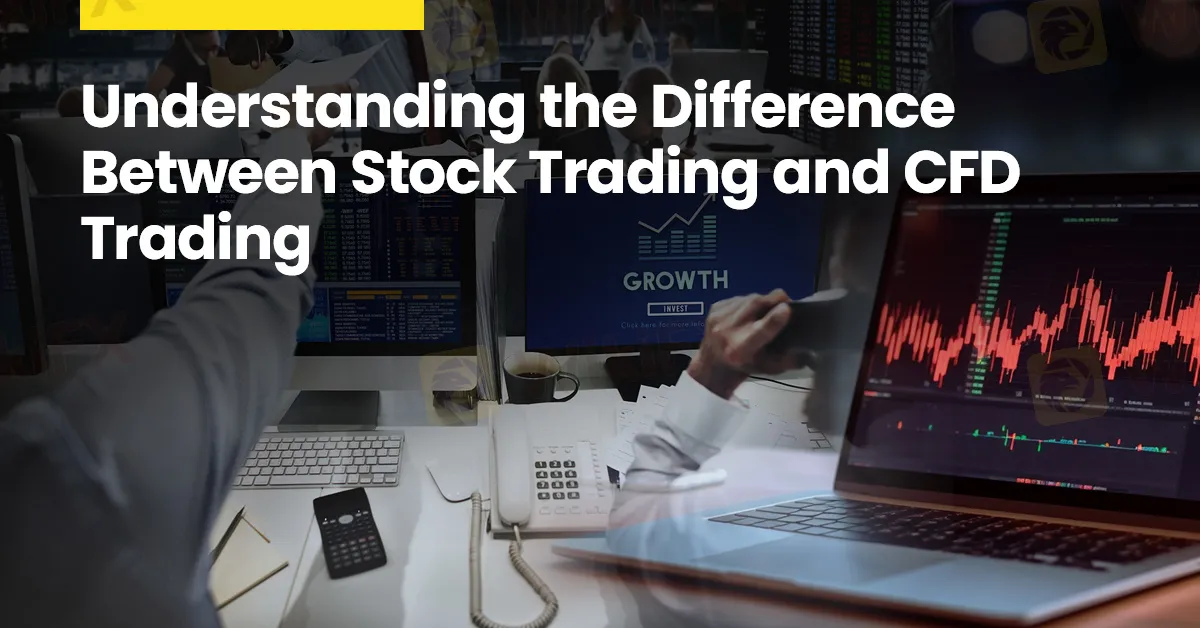简体中文
繁體中文
English
Pусский
日本語
ภาษาไทย
Tiếng Việt
Bahasa Indonesia
Español
हिन्दी
Filippiiniläinen
Français
Deutsch
Português
Türkçe
한국어
العربية
Understanding the Difference Between Stock Trading and CFD Trading
Abstract:In the dynamic world of online trading, two popular methods have emerged as favourites among traders: stock trading and trading Contracts for Difference (CFDs). This article will explain the differences between these two trading methods thoroughly.

In the dynamic world of online trading, two popular methods have emerged as favourites among traders: stock trading and trading Contracts for Difference (CFDs). While both offer opportunities to profit from market movements, they differ significantly in mechanics, risks, and potential rewards. Understanding these differences is crucial for any trader looking to navigate the financial markets effectively.

Stock trading involves buying and selling shares of publicly listed companies. When you purchase a stock, you own a portion of the company, entitling you to a share of its profits and voting rights at shareholder meetings. For instance, if you buy shares of Apple Inc., you become a partial owner of the tech giant and can benefit from its growth and dividends.
Stock trading offers several advantages, including ownership and dividends, as owning stocks means holding a stake in a company, with many companies paying dividends that provide a steady income stream. It also offers long-term growth potential, as stocks can appreciate significantly over time, and benefits from regulation and transparency, ensuring a high degree of investor protection. However, stock trading also has its drawbacks: it requires substantial capital, especially for high-priced shares, is limited to market hours which can restrict trading flexibility, and realizing significant returns can take a long time, depending on market and economic conditions.

CFDs, or Contracts for Difference, allow traders to speculate on the price movements of various financial instruments without owning the underlying asset. A CFD is a derivative product where you agree to exchange the difference in the asset's price from the moment you open the contract to when you close it. For example, if you believe Teslas stock price will rise, you can buy a CFD on Tesla shares. If the price goes up, you profit from the difference; if it falls, you incur a loss.
CFD trading offers several advantages, including leverage, which allows traders to control a large position with a relatively small amount of capital, thereby amplifying potential returns. It also provides market access, enabling traders to access a wide range of markets, including stocks, commodities, forex, and indices, from a single platform, and flexibility, as CFDs can be traded around the clock, offering greater flexibility compared to traditional stock markets. However, CFD trading also has its drawbacks: it involves high risk, as leverage can amplify losses and traders can lose more than their initial investment, there is no ownership of the underlying asset, meaning traders do not benefit from dividends or ownership rights, and it often comes with higher fees and spreads, which can eat into profits.

Imagine you have $1,000 to invest. In stock trading, you decide to buy shares of Microsoft at $250 per share. You can buy four shares. If Microsofts stock price increases by 10% to $275, your investment is now worth $1,100, giving you a $100 profit.
In contrast, with CFD trading, you could use leverage (e.g., 10:1) to control a $10,000 position in Microsoft with your $1,000. If Microsofts stock price rises by 10%, the value of your position increases to $11,000, netting you a $1,000 profit. However, if the price drops by 10%, you lose $1,000, potentially wiping out your entire investment.
In summary, both stock trading and CFD trading offer unique advantages and risks. Stock trading is ideal for those seeking ownership and long-term growth, while CFD trading appeals to those looking for flexibility and the potential for higher returns through leverage. Understanding these differences and carefully considering your risk tolerance and investment goals is essential to making informed trading decisions in todays financial markets.

Disclaimer:
The views in this article only represent the author's personal views, and do not constitute investment advice on this platform. This platform does not guarantee the accuracy, completeness and timeliness of the information in the article, and will not be liable for any loss caused by the use of or reliance on the information in the article.
Read more

What Is the Role of Central Banks in Forex Trading?
Central bank policies shape market liquidity and interest rates, directly impacting exchange rate movements. Traders must closely monitor policy shifts.

U.S. and Japan Interest Rates Hit Recent Highs – Watch Out for Short Sellers
USD/JPY briefly surged past the 150 level, driven by strong U.S. economic data, but market uncertainty remains. With expectations of a potential rate hike by the Bank of Japan, investors should closely monitor policy developments.

Unlocking the Power of Algo Trading: Benefits and Limitation
Algorithmic trading merges speed, data, and automation—but can it outsmart human intuition and market chaos? Explore its power and pitfalls.

WikiEXPO Global Expert Interview: JinDao Tai ——The Future of Forex Trading
In the era of rapid changes in financial innovation and regulation, WikiGlobal, as the organizer of WikiEXPO, has always been at the forefront of the industry, capturing key topics with keen insight and presenting deep thinking and forward-looking perspectives to the industry through a series of unique interviews. This time, we are honored to invite Mr. JinDao Tai, the Managing Director of Jindaotai.com.
WikiFX Broker
Latest News
Forex Market Outlook: Key Currency Pairs and Trading Strategies for March 24–28, 2025
Singapore Police Crack Down on Scams: $1.9M Seized, 25 Arrested
Gold Prices Swing Near Record Highs
XTB Opens New Dubai Office
Africa Cybercrime Bust: Over 300 Arrested in Fraud Crackdown
The Growing Threat of Fake Emails and Phishing Scams
Hong Kong Banks and Authorities Collaborate to Freeze Fraudulent Accounts Faster
SocialFi and the Forex Market: A New Era for Decentralized Social Trading?
Is Billion Bucks Fx Scam?
BaFin Halts USDe Token Issuance, Citing Serious Compliance Failures
Currency Calculator







